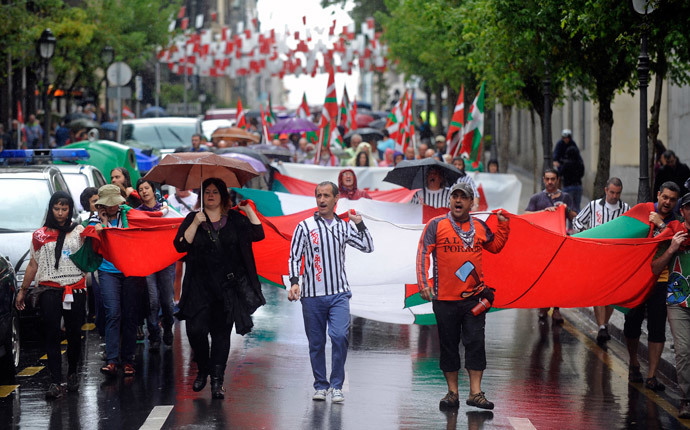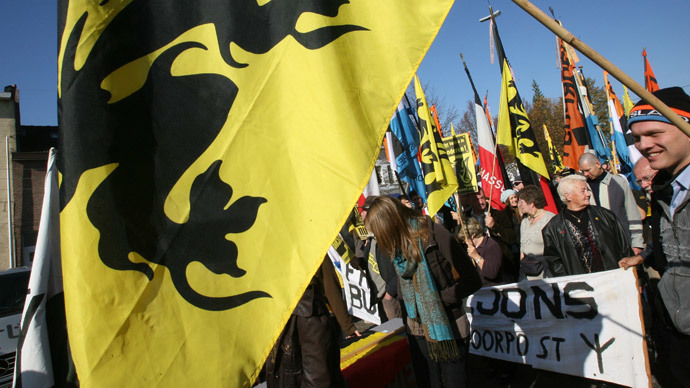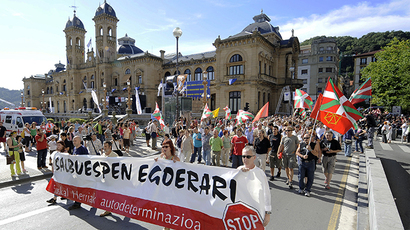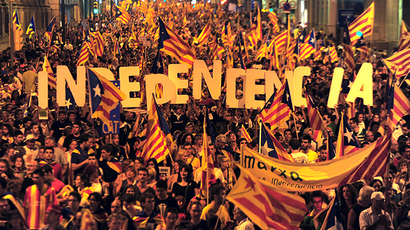Spain, Italy, Belgium: Battle lines drawn for independence after Scottish vote

The Scots have lost their stab at independence by a tiny 10-percent margin. Analysts predicted that only a ‘yes’ vote would send waves throughout Europe, but the dire economic situation of other independence-seeking regions can’t be eclipsed so easily.
In a historic referendum on Thursday, Scotland voted 55 to 45 percent to stay in the four-nation United Kingdom.
This 'yes' vote, many have said, would become a major precedent for others to follow - but can this apparent loss by an already prosperous Scotland serve as a demotivator for others? After all, according to the Venetians, or the Catalans, the far more centralized nature of their own main governments - just one factor to consider here - puts them in a markedly different situation to that of Scotland.
Catalonia’s secession movement has been growing in Spain for decades. The region has its own unique language, culture, cuisine, and architecture.
For the third year in a row, hundreds of thousands of people took to the streets of Barcelona, Catalonia’s capital, on September 11 demanding the right to vote on independence.

Catalans are set to hold a referendum on November 9, which the Spanish government strongly opposes, branding it unconstitutional. A referendum is expected to ask a two-part question: "Should Catalonia be a state?" For those who vote yes to the first question, they will then have the option to vote on the second one: "Should that state be independent?"
Catalonia represents one fifth of Spain's economy and has its own parliament, police force and control over education and health.
On Tuesday, Spain's foreign minister, José Manuel García Margallo, said his government would do everything it could to block any sort of referendum from taking place in Catalonia. "Each and every Spaniards is the owner of each and every square centimeter of the country," he said.
He also raised concerns about the consequences of Scottish independence, saying that Scottish secession would “start a process of Balkanization that nobody in Europe wants."
What the Catalans do regarding independence will likely have an impact on Spain’s Basques, who already have some autonomy.
The Basque region on the border between Spain and France has long sought independence. Around 150,000 Basques formed a 123km-long human chain on June 8 in a “Right to Decide” event, based on the human chains of 1989 in Estonia, Latvia and Lithuania as they demanded freedom from the Soviet Union.

However, the Basque region’s independence movement has been characterized by violence in the past. ETA, the primary Basque separatist and independence movement, became notorious for its terrorist activities. But in 2011, ETA declared a ceasefire.
Less publicized rumblings for independence have also been heard in equally scenic locals. Venice, one of Italy’s most romantic and visually stunning cities, declared that it wants to break away from the country. Venice and the surrounding Veneto area used to be an independent republic until the region became a part of Italy in 1866.
In March this year, nine out of ten people living in the Veneto region voted for independence in an unofficial online referendum. The question for residents was: “Do you want the Veneto to become an independent and sovereign Federal Republic?” According to the organizers, around 2.3 million people took part in the poll – 89 percent of whom voted for a split from Italy. However, experts warned that the result is not representative, because voters knew there would not be any real consequences.

Lodovico Pizzati, spokesperson for the Veneto Independence Movement, begs to differ. While he says that Italy would never allow a referendum for the simple reason that 70 percent of people would vote to secede "for sure", he also gives legitimate economic reasons for the push to secede.
“Veneto has been a net giver to Italy for [decades]. We’re talking tens of billions of dollars going to Rome and not returning. Unlike the United Kingdom, Italy is a very centralized country. So even the taxes of the smallest town have to go to Rome. Only a fraction comes back. The situation is unbearable because it’s making everyday life go toward economic decline [in a way that] people only a few years ago would not have thought of independence, and are now strongly in favor of it.”
Aside from Spain and Italy, Belgium is also facing a regional separatist movement.

Dutch-speaking Flanders in the north of Belgium has aspirations to break away from the considerably poorer French-speaking Wallonia in the south.
The New Flemish Alliance, a party that wants to split Belgium along linguistic lines, stormed to power in Flanders’ municipal elections in October last year and has pledged to achieve self-government, through independence, if necessary. The New Flemish Alliance in fact became Belgium’s biggest party in the 2010 federal elections.
Although not all Flemish citizens want outright independence, many seek greater autonomy from the current Belgian government, in order to protect Flemish culture and the Dutch language.
There are also other, more marginal separatist movements in Europe, including the small Faroe Islands in Denmark and Occitania, a region in southern France, as well as other small parts of Italy, Spain and Monaco.














